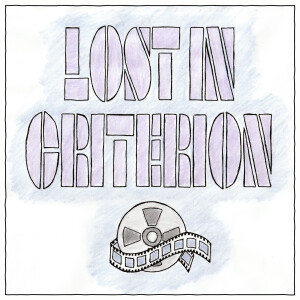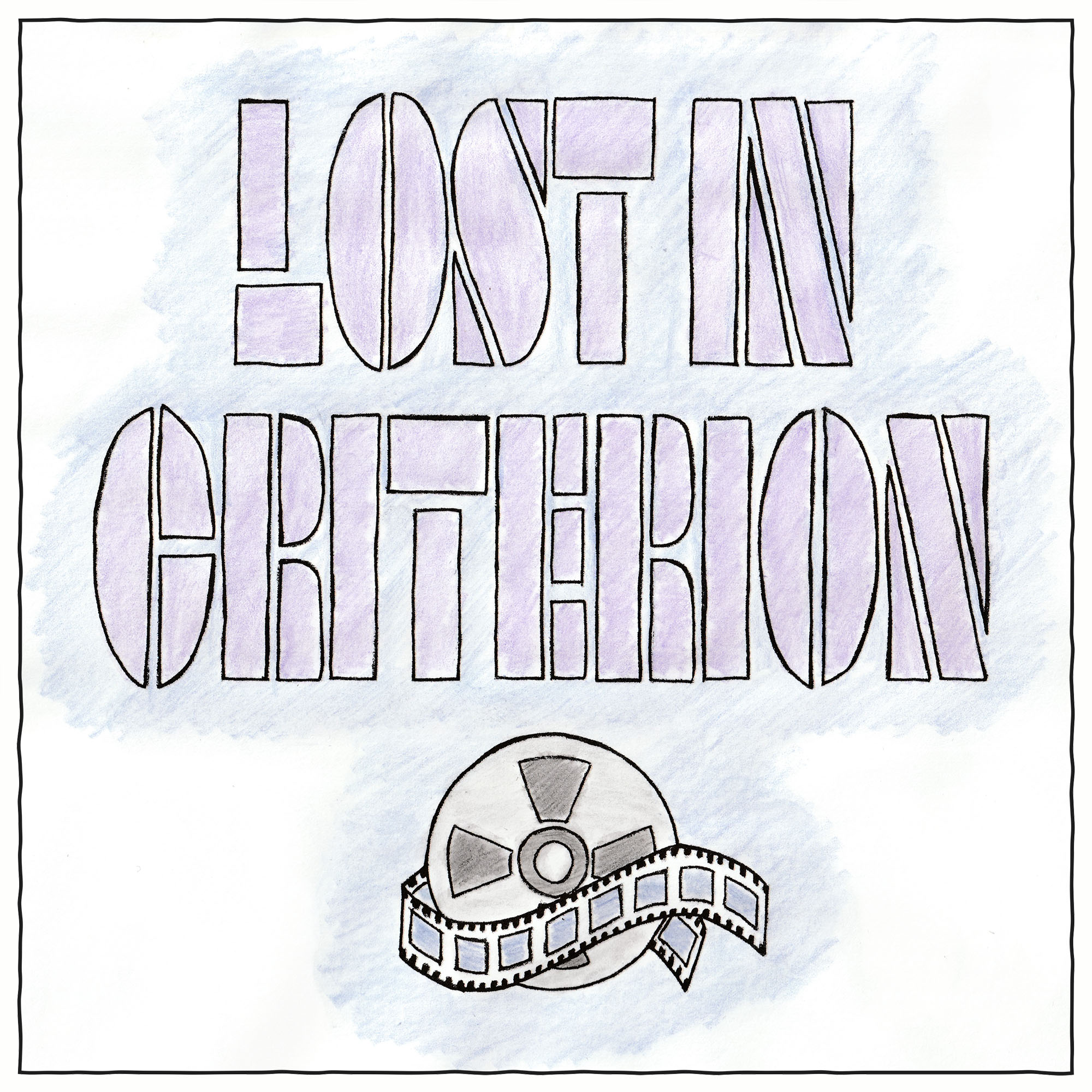Episodes

Friday Jun 17, 2016
Spine 189: The White Sheik
Friday Jun 17, 2016
Friday Jun 17, 2016
Federico Fellini's first solo feature directorial The White Sheik (1952) is everything we love about the famed Italian, and very little of what we don't. The book Adam mentions in the introduction is Harriet Russell's Envelopes and is delightful as well.

Friday Jun 10, 2016
Spine 188: Love on the Run
Friday Jun 10, 2016
Friday Jun 10, 2016
The final film in Francois Truffaut's Antoine Doinel series and our boxset, 1979's Love on the Run is a capstone and a bit of a clip show, editing in flashbacks not just to the previous four films, but recontextualizing other Jean-Pierre Leaud films in order to add more backstory. Pat isn't necessarily impressed, but that doesn't stop us from fantasizing about what this film would have been like if it was made, say, last year, with the rest of Leaud's career to pull from.

Friday Jun 03, 2016
Spine 187: Bed and Board
Friday Jun 03, 2016
Friday Jun 03, 2016
We next meet Antoine Doinel in 1970's Bed and Board. This time director Francois Truffaut has his character slightly more married but just as restless as ever before. Unfortunately, this manifests in some pretty demeaning tropes about Asian women in general, and Japanese women in particular. C'est la vie, as the French say, but perhaps more apropos: C'est la vie quand vous comptez sur les stéréotypes raciaux.

Friday May 27, 2016
Spine 186: Stolen Kisses (and Antoine and Colette)
Friday May 27, 2016
Friday May 27, 2016
Truffaut (and star Jean-Pierre Leaud) tell the continuing (and more comedic) story of Antoine Doinel, last seen running to the sea in The 400 Blows, now older but not quite wiser.

Friday May 20, 2016
Spine 184: by Brahkage: An Anthology, Volume 1
Friday May 20, 2016
Friday May 20, 2016
This week's episode is a long one solely for the plethora and variety of material we're tasked with talking about. Stan Brahkage was an experimental filmmaker and a long-time film professor at the University of Colorado, who principally focused on non-narrative film. By Brakhage covers work from six decades of his career. With over four hours of material in 26 pieces ranging from 9 seconds to 74 minutes long, there's a lot to digest: a lot to love and some, well, not to.

Friday May 13, 2016
Spone 183: Les Dames du Bois de Boulogne
Friday May 13, 2016
Friday May 13, 2016
Robert Bresson is French, and therefore I apologize for pronouncing the T in Robert throughout this episode. Jean-Luc Godard once wrote that "Robert Bresson is French cinema, as Dostoyevsky is the Russian novel and Mozart is German music." Though as it turns out Les Dames du Bois de Boulogne (1945) may have come before Bresson really became Bresson. His amazing propensity for when and how to use music is there, yeah, but this is also his last film to use professional actors, and it's only his second film. It'll be interesting to see more from him moving forward, and given his stature in French film, we certainly will.

Friday May 06, 2016
Spine 182: Straw Dogs
Friday May 06, 2016
Friday May 06, 2016
Dustin Hoffman's character in Straw Dogs (1971) is not a pacifist. If director Sam Peckinpah was trying to set up a conflict between David's values and the violent world in which he found himself, he does a terrible job of establishing David's values as any thing more than "conflict-avoidant" which is not the same thing as pacifistic. Since Pat and I really are pacifists, this distinction plays a central role in our response to the famously violent film. It doesn't help that the violent world -- where the long arm of the law is broken and religion and sleight-of-hand magic are one in the same, where a Batman villain is a peripheral character -- is a bit unrealistic. But then again, maybe that's just wishful thinking one the part of us two idealists.
All that, though, and we still really did like it.
(CW Rape: not only is this an extremely violent film, but it also contains a very controversial rape scene, which we discuss.)

Friday Apr 29, 2016
Spine 179: I am Curious...
Friday Apr 29, 2016
Friday Apr 29, 2016
Vilgot Sjöman made one of the most controversial films ever with I am Curious (Yellow) and a not very controversial at all film with I am Curious (Blue). Originally meant to be released as one film in 1967, the two are really companion pieces, telling versions of the same story Rashomon style. Or maybe not? It's all a bit confusing, not helped by the meta-narrative in which the film is being made (Sjöman plays himself, or perhaps "himself", but then that's true of star Lena Nyman as well.) We originally planned to do an episode for each movie, but it became apparent very quickly that it would be a disservice to both to talk about them in a vacuum -- they're too intertwined, too related, parallel films more than sequels or prequels. But that does make this for a longer-than-normal episode.

Friday Apr 22, 2016
Spine 178: My Life as a Dog
Friday Apr 22, 2016
Friday Apr 22, 2016
Lasse Hallström had quite a career, getting his start directing a plethora of ABBA music videos and going on to direct The Cider House Rules, What's Eating Gilbert Grape, Chocolat, and a few other awards-season darlings, though Hallström himself has never won an Oscar. Somewhere in there lies My Life as a Dog, his 1985 coming-of-age tale about life in a Swedish small town.

Friday Apr 15, 2016
Spine 177: The Lost Honour of Katharina Blum
Friday Apr 15, 2016
Friday Apr 15, 2016
Volker Schlöndorff and Margarethe von Trotta's The Lost Honour of Katharina Blum (1975) is a tale of a woman criminalized for normal behavior to the nth degree. But Blum is more than that, as it also tackles the corrupting relationship between law enforcement and the media, and how both forces spread fear through the masses, decimating civil rights under the guise of "anti-terrorism". It's brilliant, hard to watch, and teaches lessons that we continually need reminded of.

Friday Apr 08, 2016
Spine 176: The Killers
Friday Apr 08, 2016
Friday Apr 08, 2016
A great story, perhaps especially a great short story, leaves the reader to answer some of the questions. A bad one does, too, mind you, but a good one does it well? I digress. Ernest Hemingway's The Killers is a great short story that leaves a lot of questions for its readers, and for some reason people making film adaptations seek to answer them all. We're watching two such adaptations this week, and a third that leaves well enough alone. Andrei Tarkovsky's short student film version from 1956 is the most straightforward adaptation of the bunch, for better or worse. Likewise, Robert Siodmak's 1946 version starts with a straightforward retelling then veers into wildly unlikely directions with it's solid Noir adaptation. Meanwhile Don Siegal's 1964 version veers so wildly it would be nearly unrecognizable as an adaptation if it weren't for the title. But then, Siegal's is the only version with Lee Marvin as an anti-hero and Ronald Reagan in his only villainous roll. Watching any of them is a great way to spend your time, watching all three is a, well, something we did.

Friday Apr 01, 2016
Spine 175: Fear and Loathing in Las Vegas
Friday Apr 01, 2016
Friday Apr 01, 2016
"Only a goddamn lunatic would write a thing like this and then claim it was true."

Friday Mar 25, 2016
Spine 174: Band of Outsiders
Friday Mar 25, 2016
Friday Mar 25, 2016
Godard's Band of Outsiders is an immensely influential film about a woman who has zero agency in her own life.

Friday Mar 18, 2016
Spine 173: The Life and Death of Colonel Blimp
Friday Mar 18, 2016
Friday Mar 18, 2016
We return once again to films of The Archers, the illustrious British duo of Michael Powell and Emeric Pressburger, with The Life and Death of Colonel Blimp. Made during the blitz and released in 1943, Blimp is certainly a pro-war propaganda film, but specifically propagandizing what sort of war the British should be fighting. Spoiler: I find the moral of this film absolutely reprehensible. Pat doesn't find it much better

Friday Mar 11, 2016
Spine 172: Pepe le moko
Friday Mar 11, 2016
Friday Mar 11, 2016
Julien Duvivier's early noir is a film so nice America remade it twice in under a decade.

Friday Mar 04, 2016
Spine 171: Contempt
Friday Mar 04, 2016
Friday Mar 04, 2016
We give Jean-Luc Godard another shot and it really pans out for the best, considering Contempt (1963) is one of the greatest movies I've ever seen.

Friday Feb 26, 2016
Spine 170: Trouble in Paradise
Friday Feb 26, 2016
Friday Feb 26, 2016
We have our first encounter with the legendary Ernst Lubitsch this week, with his 1932 film Trouble in Paradise. Released before the code was in effect, Trouble in Paradise has all the moral-rotting adult themes, innuendos, and victorious criminals the Motion Picture Production Code sought to protect us from. It also has, quite probably, my favorite opening establishing shot of Venice in any film ever.

Friday Feb 19, 2016
Spine 167: The Complete Monterey Pop Festival
Friday Feb 19, 2016
Friday Feb 19, 2016
At the height of the Summer of Love powerhouses in pop music came together to hold the first Monterey Pop Music Festival, possibly the first pop music festival ever. D.A. Pennebaker was on hand to record the proceedings to be released as a film, though his footage was eventually released as three. We're talking all of them on this week's Lost in Criterion, including supplemental materials, as we explore the Complete Monterey Pop Festival box set containing Monterey Pop (1967), Jimi Plays Monterey (1986), and Shake! Otis at Monterey (1986).

Friday Feb 12, 2016
Spine 166: Down by Law
Friday Feb 12, 2016
Friday Feb 12, 2016
It's just so much fun watching Roberto Benigni do anything.

Saturday Feb 06, 2016
Spine 165: Man Bites Dog
Saturday Feb 06, 2016
Saturday Feb 06, 2016
Man Bites Dog bites direct cinema in the butt.

Friday Jan 29, 2016
Spine 164: Solaris
Friday Jan 29, 2016
Friday Jan 29, 2016
Stanislaw Lem, the author of the novel Solaris, hated Andrei Tarkovsky's 1972 film adaptation so very very much, though as Pat points out in our extended conversation on what to do with the "death of an author" is the author just refuses to die, this is probably just because it was different from his vision. There's a lot to talk about here, and Pat and I do a lot of talking, though this episode could have easily been 5 hours long. It's not! Don't worry!

Friday Jan 22, 2016
Spine 163: Hopscotch
Friday Jan 22, 2016
Friday Jan 22, 2016
Ronald Neame directs Hopscotch from 1980, a film co-written by Brian Garfield from his own novel, which is only interesting to point out in that Garfield also wrote the novel Death Wish. This movie is not Death Wish related, but isn’t that neat?

Friday Jan 15, 2016
Spine 162: Ratcatcher
Friday Jan 15, 2016
Friday Jan 15, 2016
We here at Lost in Criterion have a thing for depressing coming-of-age stories. And there may be none more depressing than Lynne Ramsay's 1999 debut Ratcatcher. Set against the backdrop of the 1973 Glsagow garbage strike, Ratcatcher has all the child death of George Washington and the ambiguously (false?) positive ending of 400 Blows. Hurrah!

Friday Jan 08, 2016
Spine 161: Under the Roofs of Paris
Friday Jan 08, 2016
Friday Jan 08, 2016
Under the Roofs of Paris, or Sous les toits de Paris, was Rene Clair's first sound film, released the year before our other two Clair's: Le Million and A nous la Liberte. Clair is full on just experimenting with sound and silence in this movie and it's brilliant. We've got scenes of action with no noise -- or a loud noise covering everything -- scenes of noise with no visible action, conversations that take place behind glass...as if Clair was forced to put sound into this film and his response was, "Oh yeah? I'll give you sound, alright" while rubbing his hands together. Beyond the technical marvel, it's a funny movie, though a bit light on plot as Pat is so quick to point out.

Friday Jan 01, 2016
Spine 160: A Nous la Liberte
Friday Jan 01, 2016
Friday Jan 01, 2016
We're enjoying Rene Clair again, this time with his 1931 musical A Nous la Liberte. Like Le Million and, as we'll see next week, Under the Roofs of Paris, (and like Lang's M) Clair's early sound films are experimentation with the medium, playing with sound and silence, dialogue and ambient noise. It's a fascinating window into the mind of a creative person suddenly presented with new possibilities.

